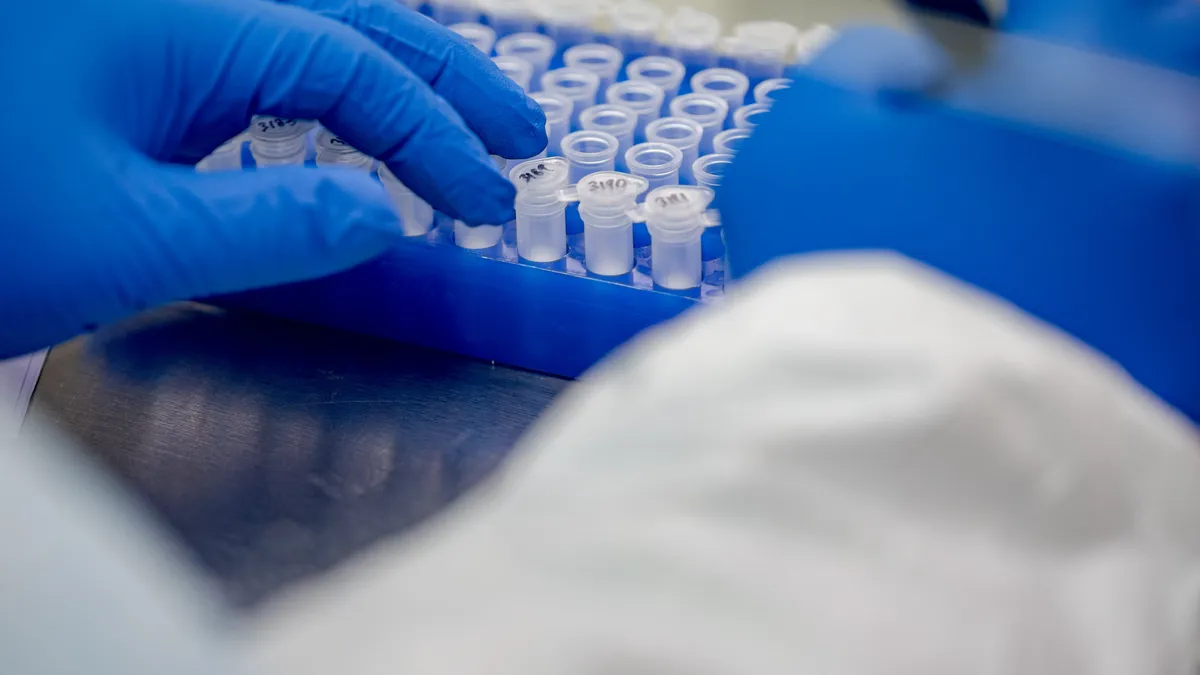Dive Brief:
- U.S. COVID-19 cases are reaching all-time highs this week and test volumes are nearing records, placing new pressures on diagnostics infrastructure, according to the American Clinical Laboratory Association.
- "The surge in demand for testing will mean that some members could reach or exceed their current testing capacities in the coming days," ACLA President Julie Khani laid out in a statement Thursday. "In cases where the number of specimens received exceeds an individual laboratory’s testing capacity, there could be an increase in their average time to deliver results."
- That warning comes a month and a half out from when CMS plans to begin reducing COVID-19 test payment to labs by 25% if they take longer than two days to return results.
Dive Insight:
While the ability of major U.S. lab networks to quickly turn around coronavirus test results — key to the usefulness of those results for contact tracing, physical isolation decisions and other mitigation measures — has shown improvement in recent months, there is concern that they might again suffer significant delays.
At certain points in July, for instance, Quest Diagnostics' average time to results was more than a week, and LabCorp's was up to six days.
Fast forward a few months: Quest reported that as of Nov. 9, its average turnaround time for molecular diagnostic testing is two days across all populations and one to two days for "priority" tests, including for hospitalized patients, presurgical patients and people in nursing homes. And LabCorp's most up-to-date report said it was averaging one day to results during the week ended Nov. 1.
With the U.S. now facing a staggering acceleration of confirmed cases, those times may be poised to go back up. Increased turnaround times could spell trouble for labs if they persist. CMS announced Oct. 15 it would reduce its COVID-19 test pay by 25% in cases when a lab takes longer than two days to deliver results, effective Jan. 1.
In the month since CMS made the announcement, the U.S. has seen a dramatic uptick in positive cases while also increasing the number of tests performed daily. An update Thursday from The COVID Tracking Project said one in every 378 U.S. residents tested positive for COVID-19 this week.
The updated payment policy will kick in Jan. 1, right after the holidays — a period public health experts are concerned will spread the virus as more people travel and attend family gatherings.
Still, the 25% reduction to $75 is off a previously increased payment rate. The Trump administration in April threw its weight behind high-throughput technologies, with CMS announcing it would double the payment rate for tests run on the more efficient machines from $51 to $100.
Labs will still be eligible for $100 payments if they complete a high-throughput test, reporting the results in two calendar days or less. They will also be eligible if, within the previous month, they complete the majority of their COVID-19 tests using high-throughput technology in two calendar days or less for all individuals tested, not just those covered under Medicare.
At least in the lead-up to this fall, revenue appeared to be booming for big lab networks like Quest and LabCorp. For the third quarter, Quest reported a nearly 43% year-over-year revenue increase to nearly $2.8 billion and LabCorp saw a 33% rise to $3.9 billion. Those spikes came from COVID-19 gains, given that their base businesses were still recovering from a significant drop in routine test volumes during the pandemic.
Supply chain constraints remain a key hindrance for labs, with ACLA's Khani calling out delays and cancelations on orders for critical materials like pipette tips. The current case surge also reduces efficacy of strategies once heralded for conserving resources.
"[S]pecimen pooling, one of the many techniques labs have developed to more efficiently use supplies and increase capacity, is only applicable for populations at low risk or with low prevalence of infection, and is therefore currently limited due to increased positivity rates in communities across the country," Khani said in Thursday's statement.














